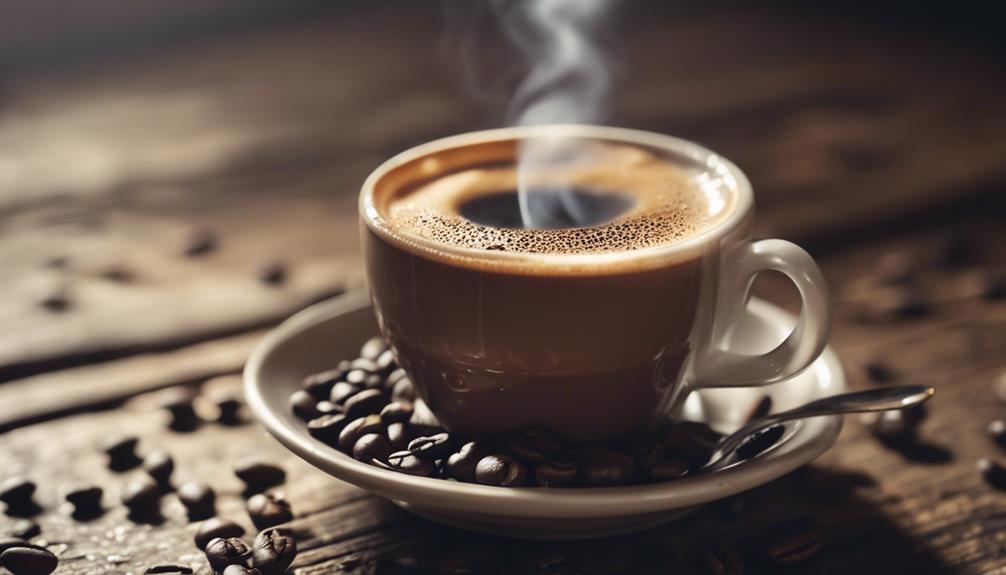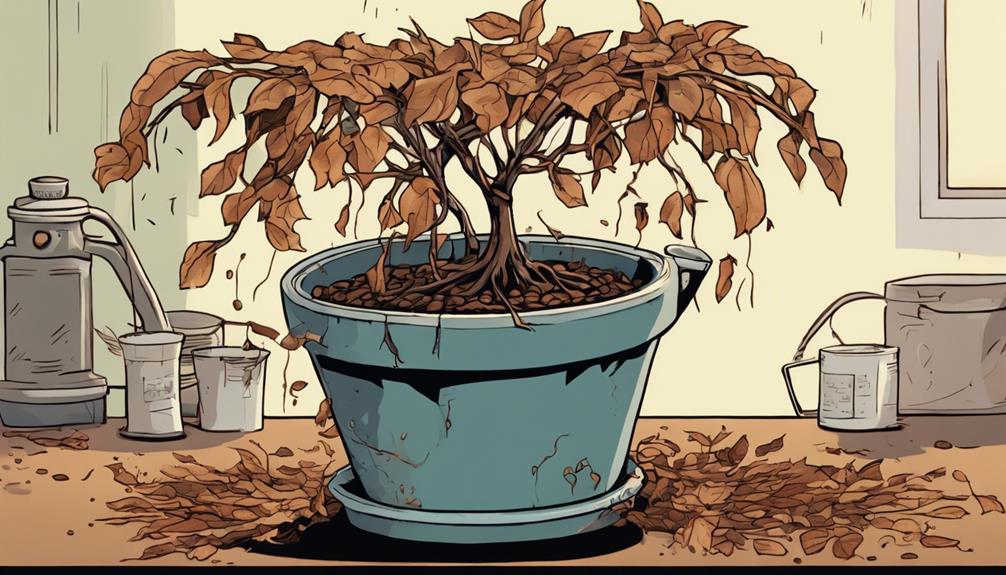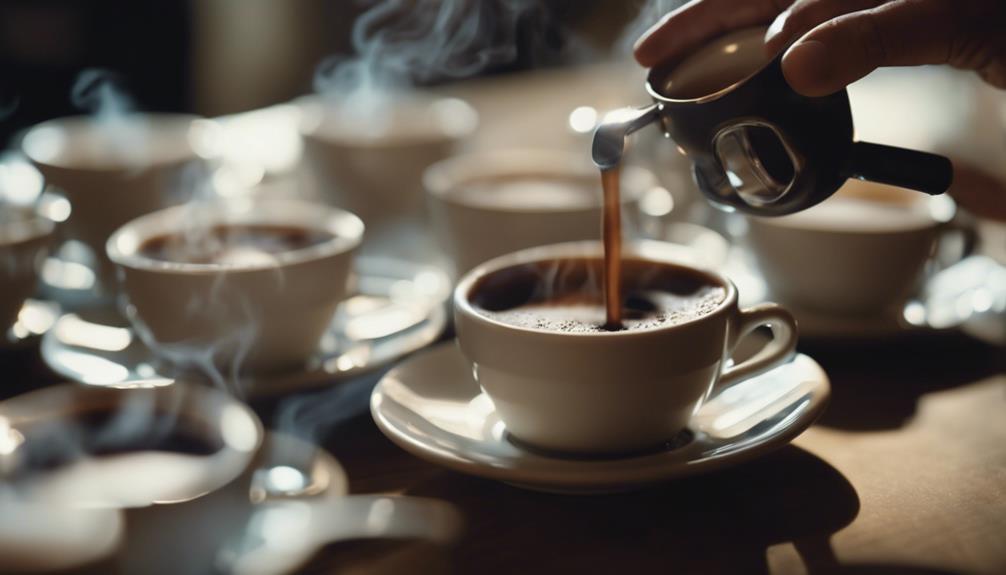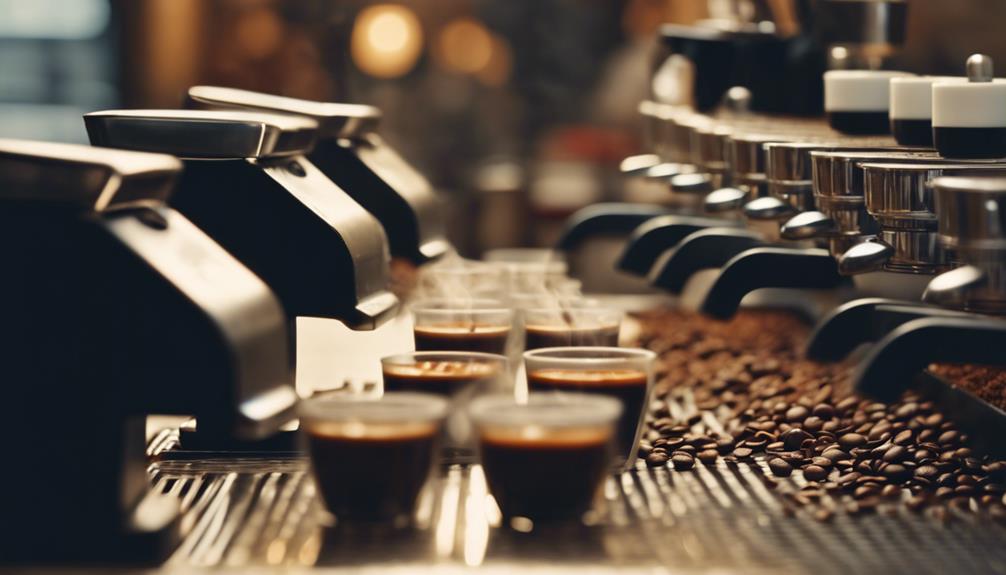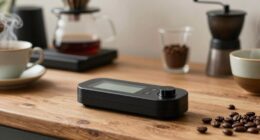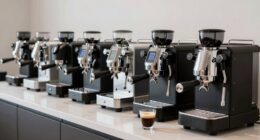You are about to learn that a standard one-ounce shot of espresso typically contains around 63 milligrams of caffeine, but this amount can vary greatly depending on factors such as the type of coffee beans, roast level, and brewing method used. For example, a double shot could have up to 126 milligrams of caffeine. Surprisingly, the caffeine content can range from 60 to 100 milligrams per shot due to the way the espresso is prepared. As you delve into the world of espresso, you will uncover more intriguing facts that will make you a caffeine enthusiast. Did you know that the safe daily consumption limit of caffeine for most adults is about 400 milligrams? Therefore, having one or two shots of espresso a day is well within the recommended range. However, it is crucial to be aware of your total caffeine intake from other sources like tea, soda, or energy drinks. Knowing how much caffeine is safe for you personally can help you enjoy your espresso without going overboard. Visit this link for more information on safe caffeine consumption.
Key Takeaways
- A standard one-ounce shot of espresso contains approximately 63 mg of caffeine, but this can range from 60-100 mg.
- A double shot (2 ounces) can contain about 126 mg of caffeine, but exact amounts vary by brand and brewing method.
- Caffeine content is affected by factors such as coffee bean type, roast level, brewing method, and extraction time.
- The high-pressure brewing process of espresso enhances caffeine concentration, making it more potent than brewed coffee.
Understanding Espresso Caffeine
When you order a shot of espresso, you're getting a concentrated dose of caffeine that can vary in amount depending on the brand and brewing method you choose. On average, a one-ounce shot of espresso contains around 63 milligrams of caffeine. However, this can fluctuate depending on the brewing method used and the type of coffee beans.
The high-pressure brewing process of an espresso machine contributes to the concentrated caffeine content in coffee. In fact, espresso has a higher caffeine content per ounce compared to brewed coffee, with approximately 40 milligrams of caffeine per ounce. This means that a double shot of espresso, which is two ounces, can pack a whopping 126 milligrams of caffeine.
But what's the actual caffeine content of your espresso shot? It's crucial to know that factors like the roast level and extraction method can influence the final amount. So, the next time you order an espresso, remember that the caffeine content can vary, and it's not just about the espresso machine, but also the brewing method used to extract the perfect shot.
Coffee Vs Espresso Caffeine Content
Now that you have a better understanding of the caffeine content in a shot of espresso, let's compare it to the caffeine content in a cup of brewed coffee.
You might be surprised to learn that an 8-ounce cup of brewed coffee generally contains about 95 milligrams of caffeine, which is more than a single shot of espresso.
However, when you look at the caffeine concentration, espresso has about 40 milligrams of caffeine per ounce, while brewed coffee averages around 12 milligrams per ounce. This means that despite its smaller serving size, espresso is a more potent source of caffeine per ounce than brewed coffee.
It's worth noting that the amount of caffeine in both espresso and coffee can vary depending on factors like coffee bean type, roasting level, and brewing methods.
However, in general, brewed coffee contains more caffeine overall due to the larger serving size.
So, if you're looking for a bigger caffeine boost, brewed coffee might be the way to go.
But if you want a more concentrated dose of caffeine, espresso is the clear winner.
Factors Affecting Caffeine Levels
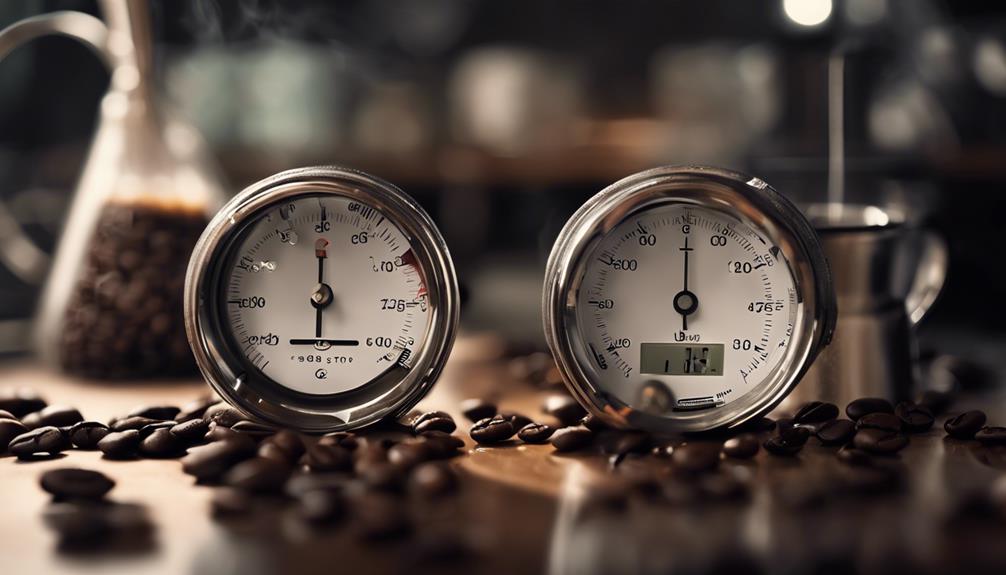
You'll find that several factors considerably impact the caffeine levels in your espresso shot, including the type of coffee beans used, roast level, brewing factors, grind size, and coffee dose.
The type of coffee beans, for instance, plays a significant role, with Robusta beans typically containing more caffeine than Arabica beans. Furthermore, the roast level affects caffeine levels, as lighter roasts generally retain more caffeine than darker roasts due to the roasting process.
Brewing factors, such as water temperature, pressure, and extraction time, also play an essential role in caffeine extraction. Higher pressure and longer extraction times result in increased caffeine content.
Additionally, the grind size of the coffee beans impacts extraction speed, where a finer grind allows for quicker caffeine extraction, while a coarser grind may lead to under-extraction.
Finally, the coffee dose used in the espresso preparation directly correlates with caffeine levels; increasing the amount of coffee grounds typically increases the caffeine proportionally.
Espresso Brewing and Caffeine Extraction
As you explore the world of espresso brewing, you'll discover that forcing hot water through finely ground coffee at high pressure is the key to maximizing caffeine extraction in espresso brewing. This process, typically involving 9 bars of pressure for 20-30 seconds, allows for ideal extraction of caffeine from the coffee beans.
| Parameter | Ideal Range |
|---|---|
| Brewing Temperature | 95-105°C |
| Grind Size | Fine |
| Pressure | 9 bars |
When you get these parameters right, you'll be rewarded with a shot of espresso that's rich in caffeine. The average shot contains around 63 mg of caffeine, but this can vary depending on the type of coffee beans used and the brewing method. The grind size of the coffee beans plays a vital role in caffeine extraction, with a finer grind allowing for quicker extraction and a coarser grind potentially leading to under-extraction. By mastering the art of espresso brewing, you'll be able to reveal the full potential of your coffee beans and enjoy a perfectly balanced shot of espresso.
Caffeine Comparison and Consumption
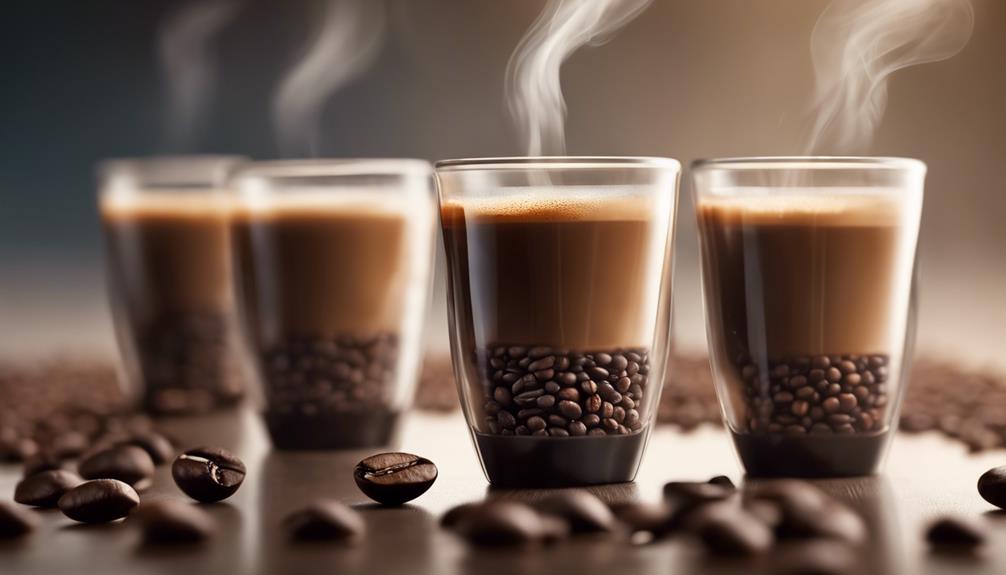
When comparing the caffeine content of espresso to other popular coffee drinks, it's evident that espresso packs a concentrated punch. A standard 1-ounce shot of espresso contains around 63 milligrams of caffeine, while a double shot packs 126 milligrams. In contrast, an 8-ounce cup of brewed coffee averages about 95 milligrams of caffeine, with some brews reaching up to 200 milligrams depending on the brewing methods and bean type.
As a coffee lover, you might be surprised to learn that espresso has a higher caffeine concentration per ounce, with approximately 40 milligrams of caffeine per ounce compared to about 12 milligrams per ounce for brewed coffee.
Decaffeinated espresso is also an option, containing about 5-15 milligrams of caffeine per shot. However, be mindful of your caffeine intake when consuming multiple espresso shots, as this can considerably increase your overall caffeine levels.
Whether you're a fan of lattes or Americanos, it's crucial to be aware of the caffeine content in your daily cup. By understanding the caffeine levels in espresso shots and other coffee drinks, you can make informed choices that suit your taste and sensitivity.
Recommended Daily Caffeine Intake
The FDA sets a daily caffeine limit of 400 milligrams for most healthy adults, a threshold you can reach with just four cups of brewed coffee or about six shots of espresso. This recommended daily caffeine intake is important to keep in mind, especially if you're an espresso enthusiast.
However, pregnant individuals should be more cautious, limiting their caffeine consumption to 200 milligrams per day to reduce potential risks to the fetus.
It's also essential to take into account your individual sensitivity to caffeine, as you may experience side effects like jitteriness or insomnia even at lower doses. Remember, consuming caffeine in moderation is generally regarded as safe, with moderate intake defined as 200-400 milligrams per day being associated with health benefits for many individuals.
Be mindful of your body's response to caffeine, and adjust your espresso habit accordingly. With this knowledge, you can enjoy your daily shots of espresso while staying within a safe and healthy range.
Enjoying Espresso Responsibly
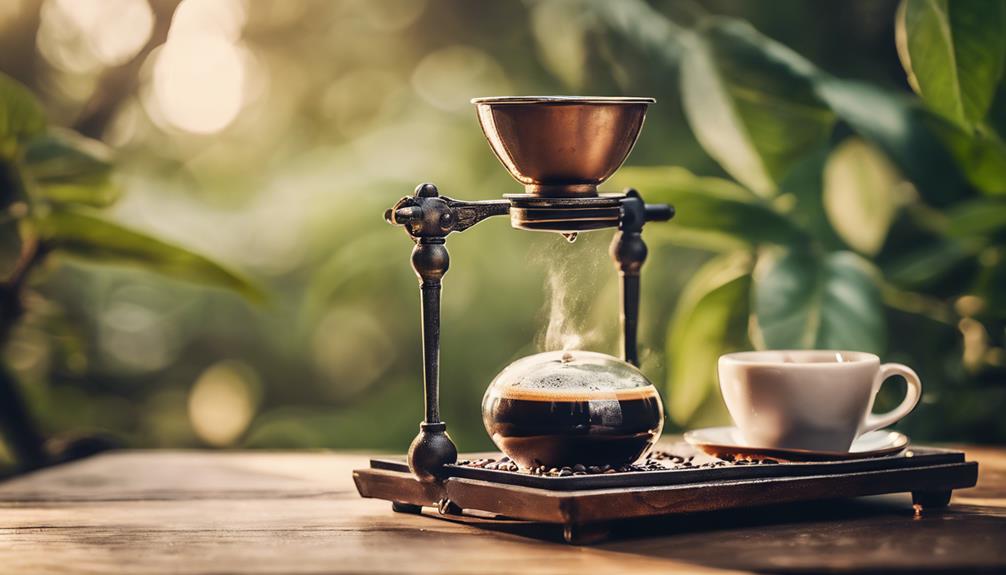
As you start exploring the world of espresso, it's important to remember that enjoying it responsibly involves being mindful of your caffeine intake.
You should be aware of your personal caffeine limits and keep track of how much you're consuming from all sources, not just espresso.
Caffeine Intake Limits
You need to be mindful of your daily caffeine intake to enjoy espresso responsibly, knowing that exceeding the recommended limits can lead to negative side effects.
The FDA recommends a maximum daily caffeine intake of 400 milligrams for healthy adults, which is equivalent to about six shots of espresso, taking into account the average one-ounce shot contains approximately 63 milligrams of caffeine.
However, it's crucial to reflect on your individual sensitivity to caffeine, as this can vary greatly. Pregnant individuals, for example, should limit their caffeine consumption to 200 milligrams per day.
To enjoy espresso responsibly, you must practice moderation. Consuming multiple shots in a short time can lead to increased jitteriness and anxiety. Be aware of your mg per shot and adjust your intake accordingly.
By doing so, you'll be able to appreciate the rich flavor and energy boost of espresso while avoiding negative consequences.
Espresso in Recipes
Now that you've learned to enjoy espresso responsibly, let's explore how this rich and flavorful beverage can elevate your cooking and baking with its versatility in various recipes.
Espresso serves as a versatile ingredient, enhancing both sweet and savory dishes with its rich flavor and caffeine content. You can incorporate espresso into classic desserts like chocolate espresso truffles and coffee toffee bars to intensify chocolate flavors and add depth.
It can also be the base for popular coffee cocktails, such as espresso martinis, combining the bold coffee flavor with spirits for a delightful drink.
In baking, espresso can enhance the overall taste of cakes and brownies while providing an added caffeine boost. Plus, espresso slushies offer a revitalizing way to enjoy the beverage on warm days, blending espresso with ice and flavors for a cool treat.
With its unique flavor profile and caffeine content, espresso can be used in a wide range of recipes. Experiment with different espresso recipes to unleash its full potential and take your cooking and baking to the next level.
Espresso Caffeine Content Variations
Factors like coffee bean type, brewing method, and shot size greatly influence the caffeine content of your espresso, resulting in a notable range of caffeine levels from one shot to another.
When it comes to espresso caffeine content variations, you'll find that a standard single shot of espresso typically contains between 60-100 mg of caffeine, with an average of around 63 mg. However, this can vary depending on the type of coffee beans used, with Robusta beans generally containing higher caffeine levels than Arabica beans.
The brewing method also plays a role, as espresso requires finely ground coffee and high pressure, resulting in efficient caffeine extraction. If you opt for a double shot, you can expect around 126 mg of caffeine, effectively doubling your caffeine intake.
Decaffeinated espresso is also an option, containing about 5-15 mg of caffeine per shot, making it a good choice for those sensitive to caffeine.
Coffee Bean and Roast Impact
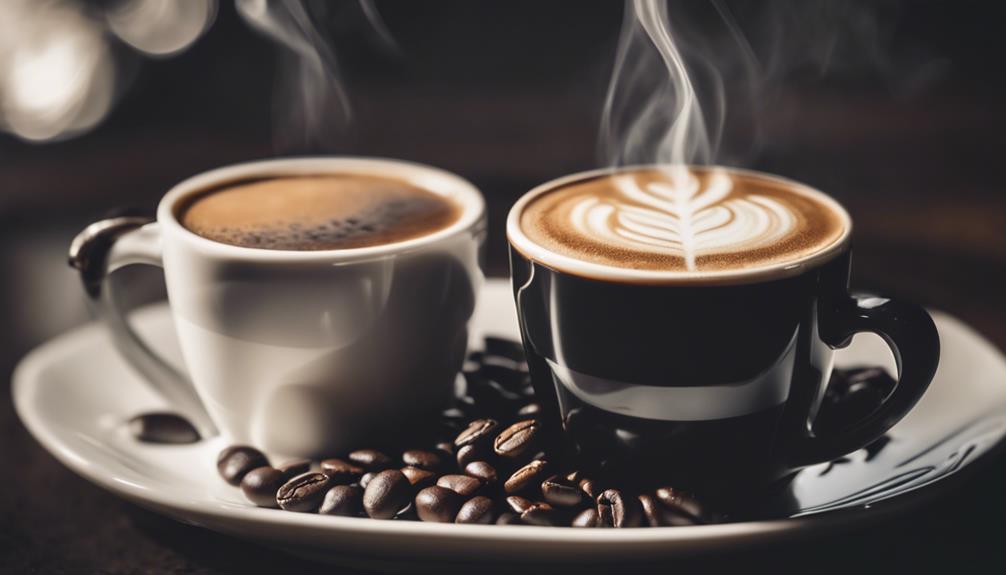
The type of coffee bean you choose has a significant impact on the caffeine content of your espresso, with Robusta beans packing about twice the caffeine punch of Arabica beans. This significant difference in caffeine concentration can greatly affect your espresso's overall caffeine content.
Additionally, the roast level of your coffee beans also plays a role in determining the caffeine content. Lighter roasts generally retain slightly more caffeine than darker roasts, as the roasting process causes some caffeine loss. This means that if you're looking for a higher caffeine kick, lighter roasts might be the way to go.
When brewing your espresso, the grind size of your coffee also comes into play. A finer grind allows for quicker caffeine extraction due to the increased surface area, making it ideal for espresso.
Moreover, the brewing method itself also affects the caffeine extraction. Espresso, which involves high pressure, tends to extract more caffeine in a shorter amount of time compared to traditional brewing methods like drip coffee.
Caffeine and Health Considerations
You're probably wondering how much caffeine is safe to consume daily, and what the potential health implications are of frequent espresso shots.
The good news is that moderate caffeine consumption, defined as 200-400 milligrams per day, is generally considered safe and may even enhance physical performance and mental alertness.
However, it's important to be mindful of your personal tolerance levels, as excessive intake can lead to negative side effects such as:
- Jitteriness and anxiety
- Insomnia and disrupted sleep patterns
- Headaches and migraines
If you're pregnant, it's vital to limit your caffeine intake to 200 milligrams per day to avoid potential health risks.
Remember, the FDA recommends a maximum daily caffeine intake of 400 milligrams for healthy adults, which translates to about six shots of espresso.
Be aware of your caffeine consumption and adjust accordingly to maintain a healthy and balanced lifestyle.
Frequently Asked Questions
How Much Caffeine Is in a Single Shot of Espresso?
You're wondering how much caffeine is in a single shot of espresso? On average, it contains around 63 milligrams of caffeine, but this can vary by brand and preparation method, with some shots having up to 75 milligrams. Excessive espresso consumption can lead to a variety of health issues, including increased heart rate, anxiety, insomnia, and digestive problems. It’s important to enjoy your espresso in moderation and be mindful of your overall caffeine intake. Remember that caffeine affects individuals differently, so pay attention to how your body responds to it.
Is 2 Shots of Espresso a Lot of Caffeine?
You're wondering if two shots of espresso are a lot of caffeine? Honestly, with 126 milligrams, it's a moderate amount, but within the safe daily limit – you'll likely feel energized, not overwhelmed, unless you're super sensitive to caffeine.
What Is Considered 1 Shot of Espresso?
When you order a shot of espresso, do you wonder what you're getting? You're getting 1 ounce of rich, concentrated coffee, brewed under high pressure, with a signature layer of crema on top – that's one standard shot of espresso!
Is 20 Shots of Espresso Too Much?
You're wondering if 20 shots of espresso are too much? Absolutely, it's way over the recommended daily caffeine limit, and you'll likely experience anxiety, insomnia, and other negative effects – it's a recipe for disaster!
Conclusion
As you savor the last drop of your espresso, the caffeine buzz begins to kick in, energizing your senses and transporting you to a state of alertness.
Imagine the rich, bold flavors of your espresso shot as a key releasing your mental clarity, focus, and creativity.
With this newfound understanding of espresso's caffeine content, you're now empowered to craft the perfect cup, tailored to your unique needs and preferences, and indulge in the ultimate coffee experience.
